Act One
A square in Sevilla. Soldiers are whiling away the time in front of their guardhouse. Micaela enters and asks after Don Jose, who, however, is not expected until the changing of the guard. She says she will return again and runs off as the men laugh at her.
The new guard marches up. Morales tells Jose about the girl who asked after him. From the description Jose realises it is Micaela, an orphan living in his mother‘s house.
Lieutenant Zuniga questions Jose about the reputedly attractive female workers in the nearby tobacco factory. Suddenly the factory bell sounds for a break. The women pour into the square, eagerly watched by the men. They ask after Carmen, the wellknown gypsy. She enters and scornfully throws an acacia flower to Jose, who takes no notice of her at first.
After the break Don Jose remains behind. Carmen has cast her demonic spell on him. Micaela returns bringing him a letter and a kiss from his mother which she implants on his forehead. Jose wants to resist being led into temptation by Carmen and intends to marry Micaela in accordance with his mother‘s wishes.
An argument breaks out in the factory, the noise of which is heard outside. Carmen has injured a woman with her knife. As a result of the incident the girls come running out of the factory, arguing and fighting. They are separated by the soldiers. When Carmen makes fun of the incident and the interrogation, Zuniga orders Don Jose to escort her to prison. Carmen persuades Don Jose to let her escape on the way. As a reward she promises to spend the night with him in Lilla Pastia‘s tavern. Don Jose is torn between desire and his sense of duty. Finally he releases Carmen‘s bonds so that she can escape.
Act Two
Carmen and her friends Mercedes and Frasquita are sitting with Zuniga and his fellow officers in the tavern watching the dancing and singing. The tavernkeeper Lillas Pastia urges the soldiers to leave. Carmen learns from Zuniga that as punishment Jose has been demoted and placed under arrest, but that he has since been released.
The renowned bullfighter Escamillo enters the tavern and is immediately attracted to Carmen. He pays court to her with gallantry but she rejects his advances. Finally Escamillo and Zuniga and his men depart.
The smugglers Dancairo and Remendado try to convince the three gypsy women to help them with their next operation. Carmen refuses: she loves Don Jose. His voice is heard outside and the smugglers conceal themselves.
Carmen welcomes her eagerly awaited beloved. She dances and sings for him. Suddenly the bugle for roll call is heard and Jose wants to return to the baracks. Carmen makes fun of his sense of duty. Jose assures Carmen once again of his deepest love for her. He rejects, however, her offer to join with her and lead the life of a smuggler. As he is about to leave, Zuniga enters. There is a violent quarrel during which Carmen throws herself between the men. The smugglers and some gypsies overpower the lieutenant and tie him up. Now Don Jose is trapped; he has no choice but to flee to the mountains with the smugglers.
Act Three, First Scene
A gorge in the mountains.The smugglers want to bring their booty into the city unnoticed.
Meanwhile Carmen has lost interest in Jose. His attempts to win her back prove fruitless.
Carmen, Mercedes and Frasquita are telling each other‘s fortune. While the cards foretell good fortune for her friends, for Carmen they signify death.
Dancairo and Remendado return from their reconnaissance mission. The women are to distract the customs officers while the men smuggle the wares over the border. This sparks off Jose‘s jealousy again. While the others leave for the city, he is to guard the remaining merchandise.
Micaela appears in the gorge. She is looking for Don Jose. The eerie place makes her feel frightened. When Escamillo appears she hides. Jose and Escamillo meet and engage in a violent struggle. Carmen Prevents Jose from killing the torero. In return Escamillo invites her and all her companions to the next bullfight in the arena in Sevilla. The humiliated Jose warns Carmen to no avail. As the smugglers are about to depart for Sevilla, they discover Micaela in her hiding place. Jose refuses to return with her to his mother. When Micaela reveals to him that his mother is dying, he reconsiders. He grimly prophesies to Carmen that they will meet again.
Act Three, Second Scene
A square in Seville outside the arena, shortly before the bullfight. Escamillo enters with his large entourage and Carmen at his side. She does not heed Frasquita‘s warning that the jealous Jose is hiding in the crowd. All enter the arena, Carmen remains behind with Jose.
Jose still loves Carmen. She refuses, however, to go back to him and start a new life together. She wants to keep her freedom and not be bound to obey anybody. To underline this, Carmen throws the ring he once gave her at his feet. Jose stabs Carmen as Escamillo‘s victory is being celebrated in the arena. He collapses over her body in despair.
Translation: Christopher Balme
© Bayerische Staatsoper
Place: Seville, Spain, and surrounding hills
Time: Around 1820
Act 1
A square, in Seville. On the right, a door to the tobacco factory. At the back, a bridge. On the left, a guardhouse.
A group of soldiers relaxes in the square, waiting for the changing of the guard and commenting on the passers-by ("Sur la place, chacun passe"). Micaëla appears, seeking José. Moralès tells her that "José is not yet on duty" and invites her to wait with them. She declines, saying she will return later. José arrives with the new guard, who is greeted and imitated by a crowd of urchins ("Avec la garde montante").
As the factory bell rings, the cigarette girls emerge and exchange banter with young men in the crowd ("La cloche a sonné"). Carmen enters and sings her provocative habanera on the untameable nature of love ("L'amour est un oiseau rebelle"). The men plead with her to choose a lover, and after some teasing she throws a flower to Don José, who thus far has been ignoring her but is now annoyed by her insolence.
As the women go back to the factory, Micaëla returns and gives José a letter and a kiss from his mother ("Parle-moi de ma mère!"). He reads that his mother wants him to return home and marry Micaëla, who retreats in shy embarrassment on learning this. Just as José declares that he is ready to heed his mother's wishes, the women stream from the factory in great agitation. Zuniga, the officer of the guard, learns that Carmen has attacked a woman with a knife. When challenged, Carmen answers with mocking defiance ("Tra la la... Coupe-moi, brûle-moi"); Zuniga orders José to tie her hands while he prepares the prison warrant. Left alone with José, Carmen beguiles him with a seguidilla, in which she sings of a night of dancing and passion with her lover—whoever that may be—in Lillas Pastia's tavern. Confused yet mesmerised, José agrees to free her hands; as she is led away she pushes her escort to the ground and runs off laughing. José is arrested for dereliction of duty.
Act 2
Lillas Pastia's Inn
Two months have passed. Carmen and her friends Frasquita and Mercédès are entertaining Zuniga and other officers ("Les tringles des sistres tintaient") in Pastia's inn. Carmen is delighted to learn of José's release from two months' detention. Outside, a chorus and procession announces the arrival of the toreador Escamillo ("Vivat, vivat le Toréro"). Invited inside, he introduces himself with the "Toreador Song" ("Votre toast, je peux vous le rendre") and sets his sights on Carmen, who brushes him aside. Lillas Pastia hustles the crowds and the soldiers away.
When only Carmen, Frasquita and Mercédès remain, smugglers Dancaïre and Remendado arrive and reveal their plans to dispose of some recently acquired contraband ("Nous avons en tête une affaire"). Frasquita and Mercédès are keen to help them, but Carmen refuses, since she wishes to wait for José. After the smugglers leave, José arrives. Carmen treats him to a private exotic dance ("Je vais danser en votre honneur ... La la la"), but her song is joined by a distant bugle call from the barracks. When José says he must return to duty, she mocks him, and he answers by showing her the flower that she threw to him in the square ("La fleur que tu m'avais jetée"). Unconvinced, Carmen demands he show his love by leaving with her. José refuses to desert, but as he prepares to depart, Zuniga enters looking for Carmen. He and José fight, and are separated by the returning smugglers, who restrain Zuniga. Having attacked a superior officer, José now has no choice but to join Carmen and the smugglers ("Suis-nous à travers la campagne").
Act 3
A wild spot in the mountains
Carmen and José enter with the smugglers and their booty ("Écoute, écoute, compagnons"); Carmen has now become bored with José and tells him scornfully that he should go back to his mother. Frasquita and Mercédès amuse themselves by reading their fortunes from the cards; Carmen joins them and finds that the cards are foretelling her death, and José's. The women depart to suborn the customs officers who are watching the locality. José is placed on guard duty.
Micaëla enters with a guide, seeking José and determined to rescue him from Carmen ("Je dis que rien ne m'épouvante"). On hearing a gunshot she hides in fear; it is José, who has fired at an intruder who proves to be Escamillo. José's pleasure at meeting the bullfighter turns to anger when Escamillo declares his infatuation with Carmen. The pair fight ("Je suis Escamillo, toréro de Grenade"), but are interrupted by the returning smugglers and girls ("Holà, holà José"). As Escamillo leaves he invites everyone to his next bullfight in Seville. Micaëla is discovered; at first, José will not leave with her despite Carmen's mockery, but he agrees to go when told that his mother is dying. As he departs, vowing he will return, Escamillo is heard in the distance, singing the toreador's song.
Act 4
A square in Seville. At the back, the walls of an ancient amphitheatre
Zuniga, Frasquita and Mercédès are among the crowd awaiting the arrival of the bullfighters ("Les voici ! Voici la quadrille!"). Escamillo enters with Carmen, and they express their mutual love ("Si tu m'aimes, Carmen"). As Escamillo goes into the arena, Frasquita and Mercedes warn Carmen that José is nearby, but Carmen is unafraid and willing to speak to him. Alone, she is confronted by the desperate José ("C'est toi ! C'est moi !"). While he pleads vainly for her to return to him, cheers are heard from the arena. As José makes his last entreaty, Carmen contemptuously throws down the ring he gave her and attempts to enter the arena. He then stabs her, and as Escamillo is acclaimed by the crowds, Carmen dies. José kneels and sings "Ah! Carmen! ma Carmen adorée!"; as the crowd exits the arena, José confesses to killing the woman he loved.


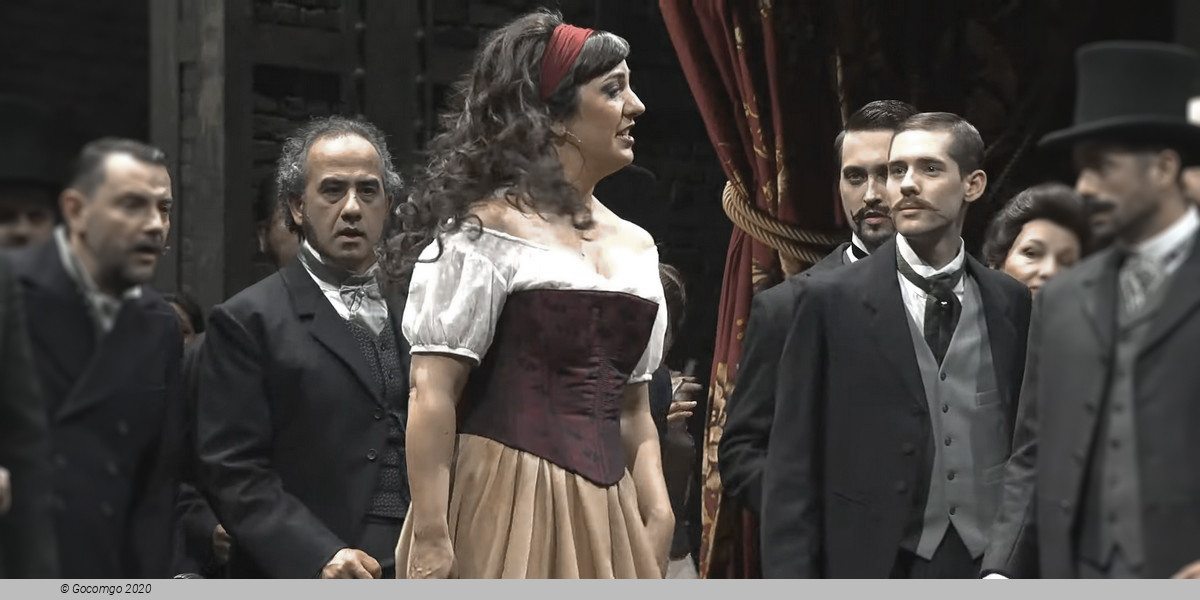
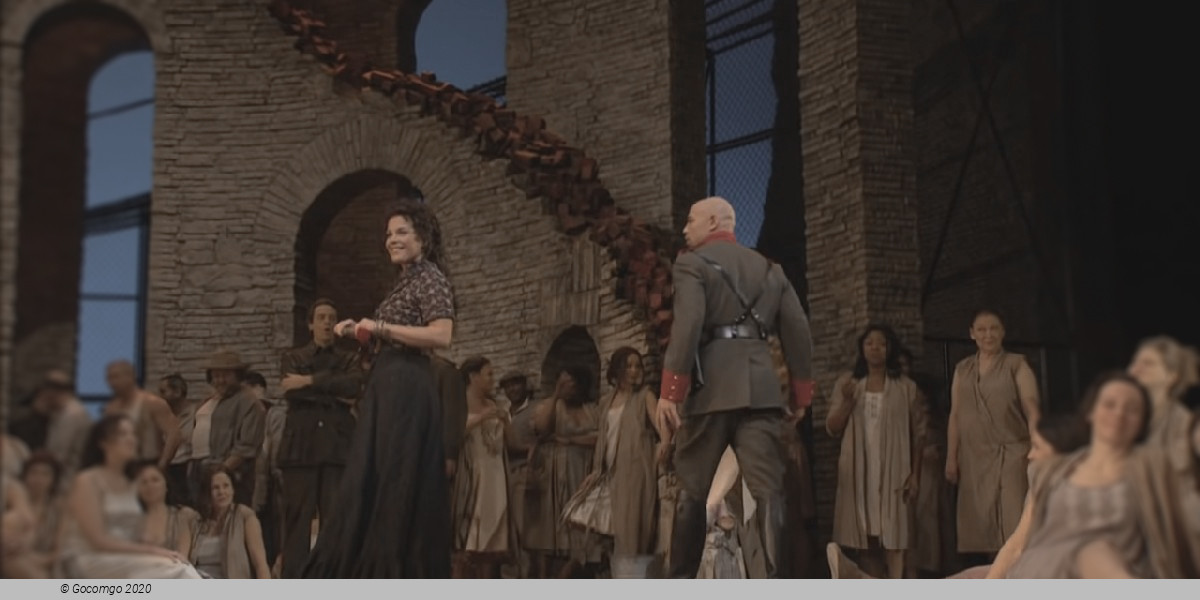
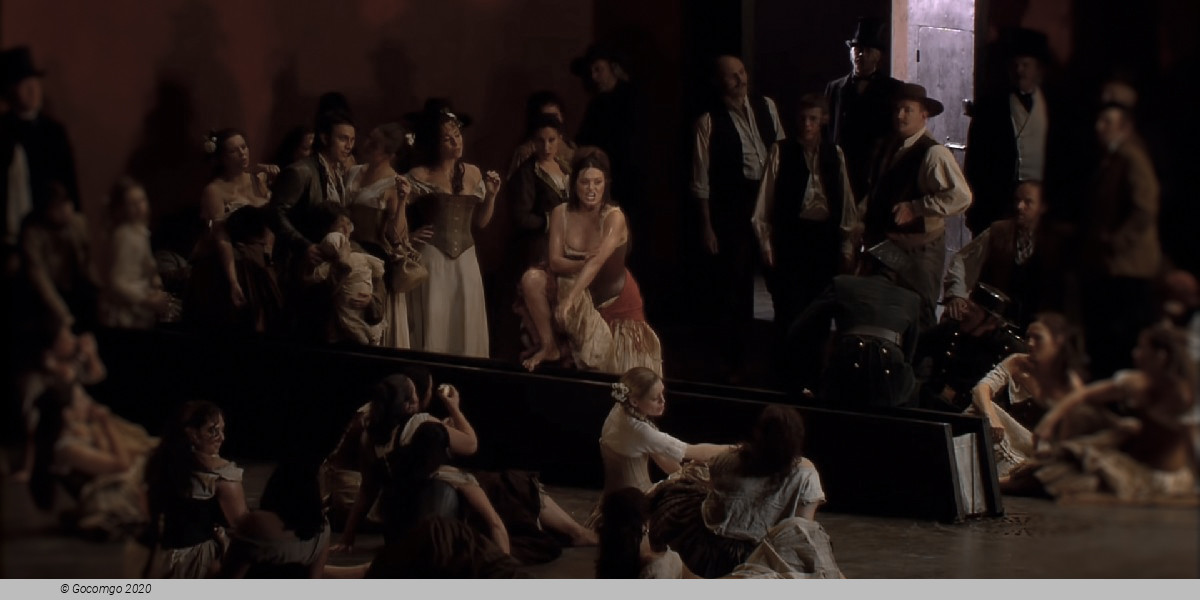
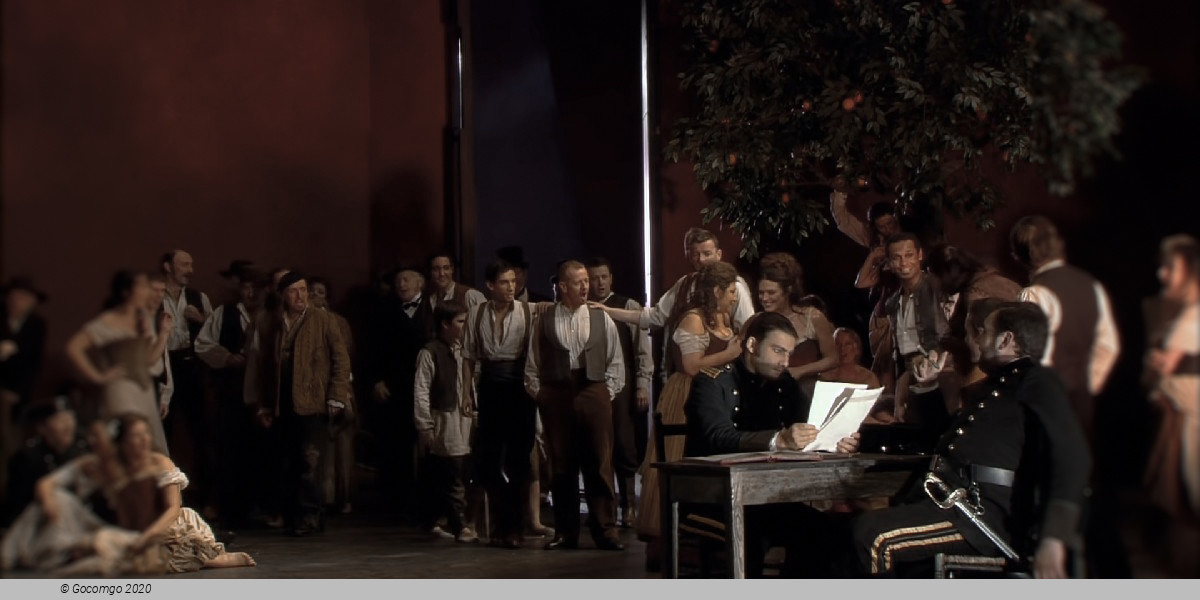
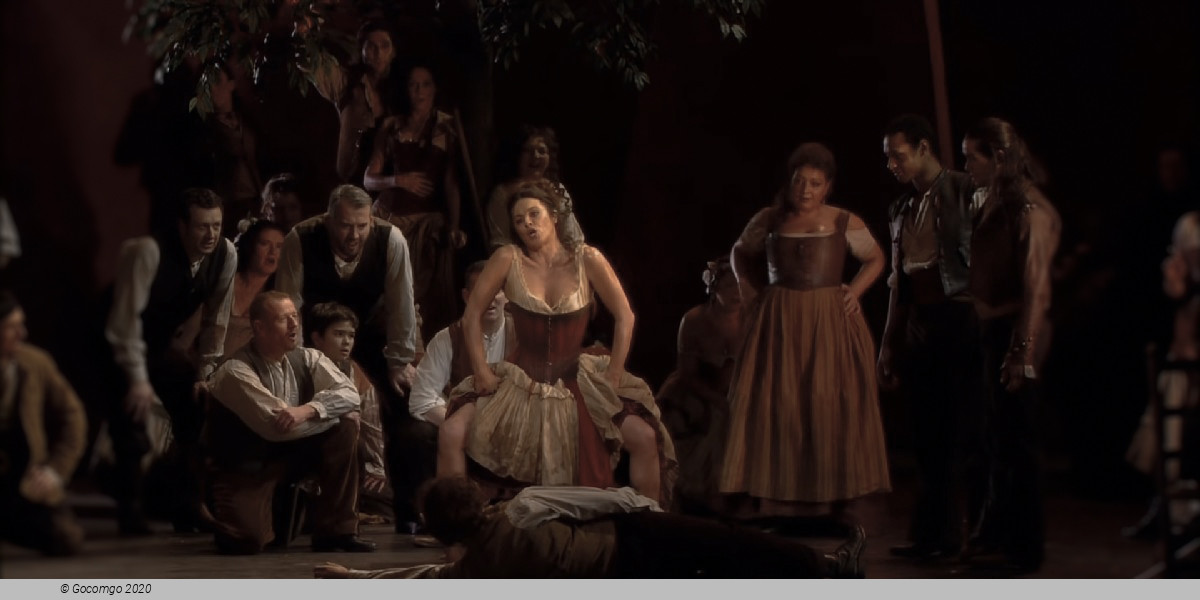
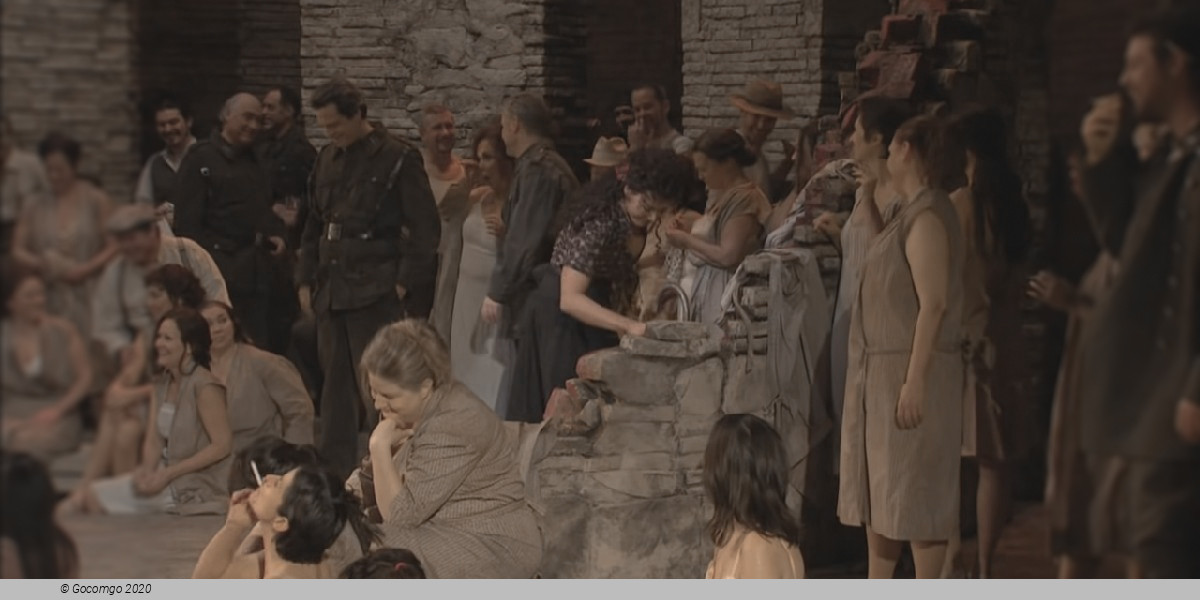
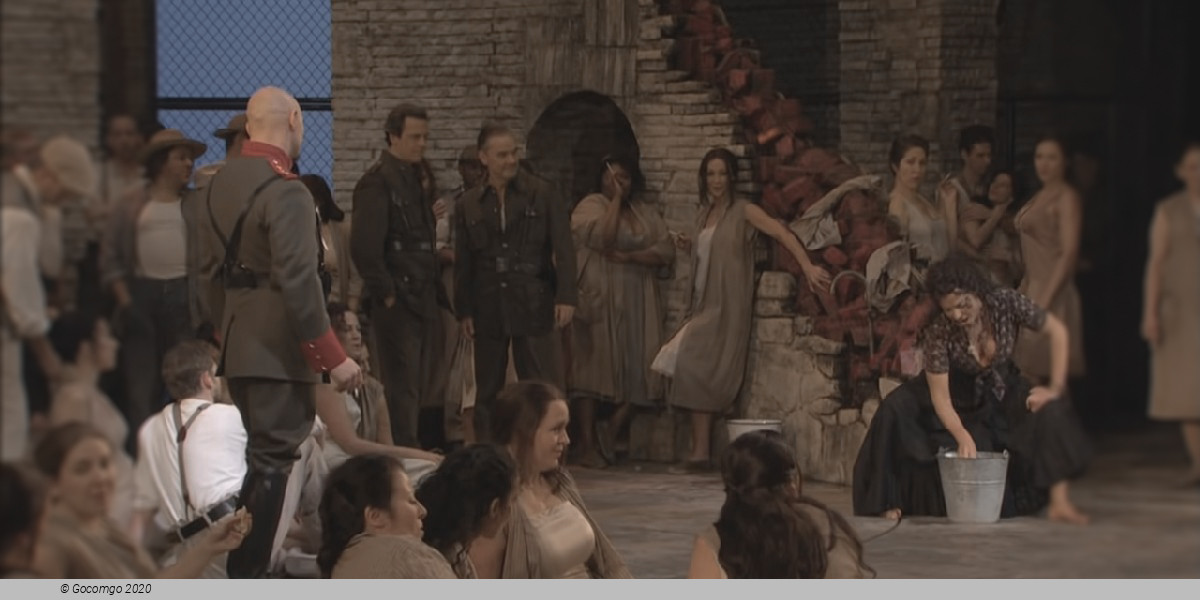
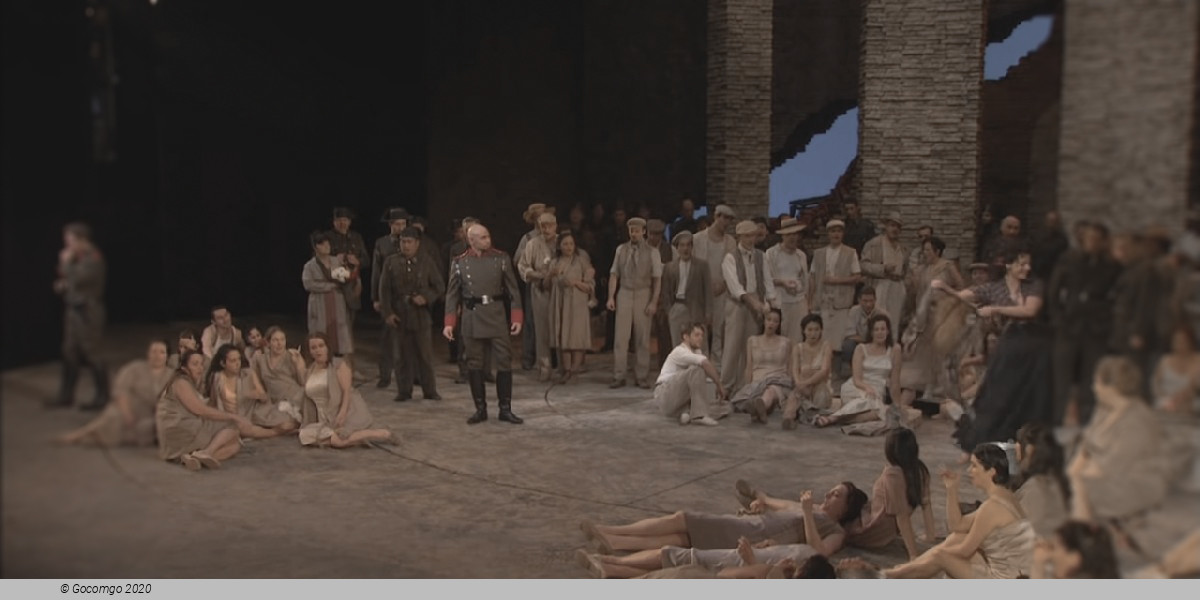
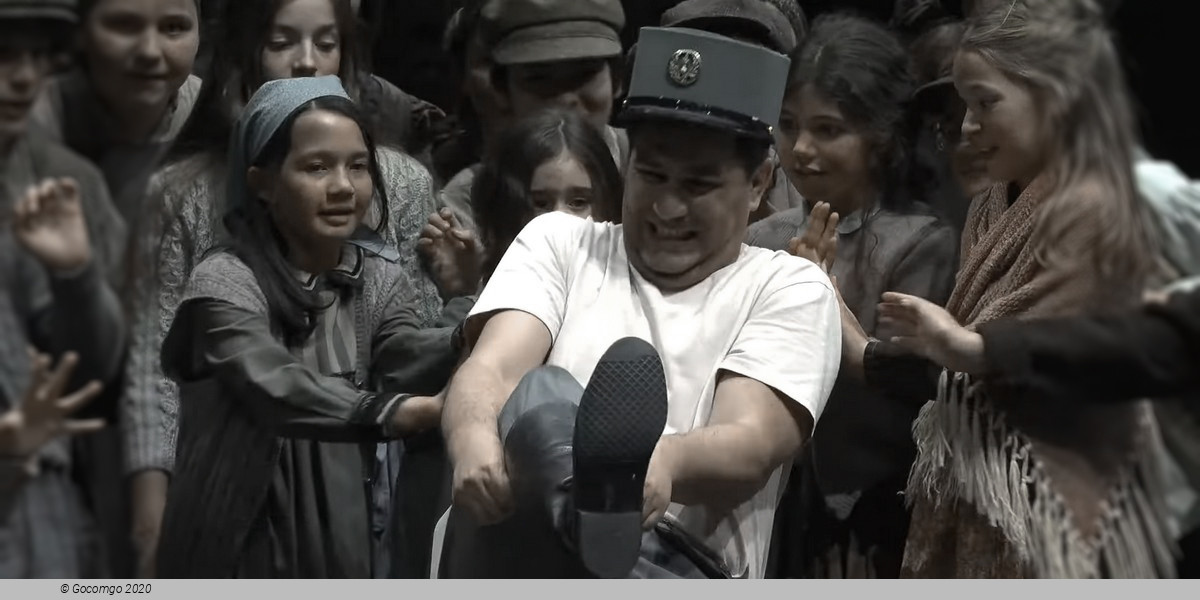
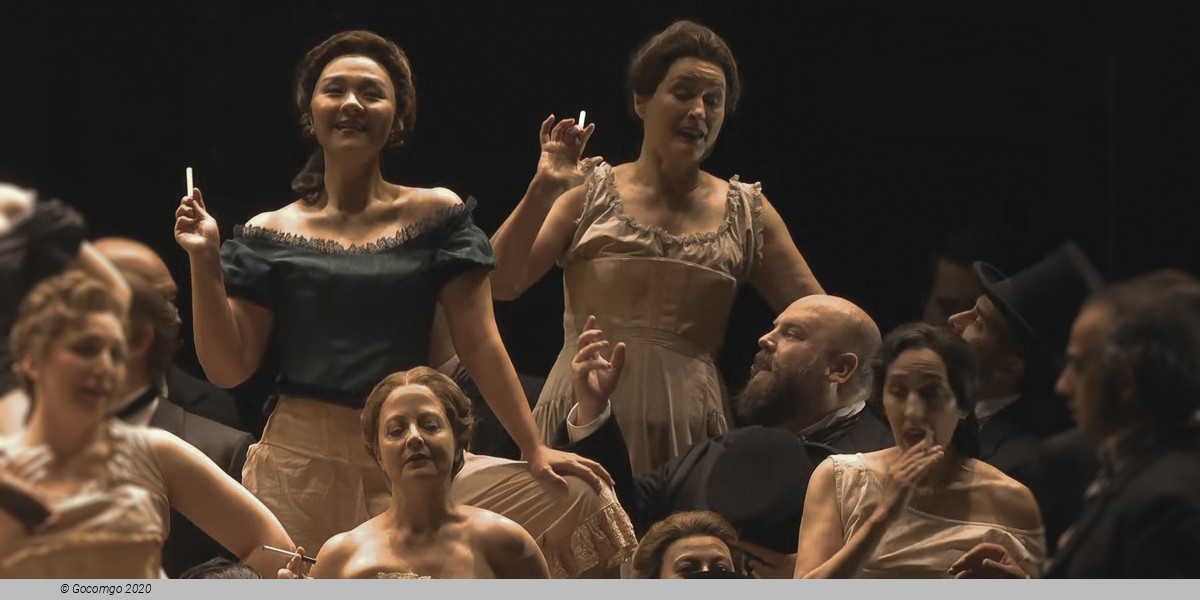
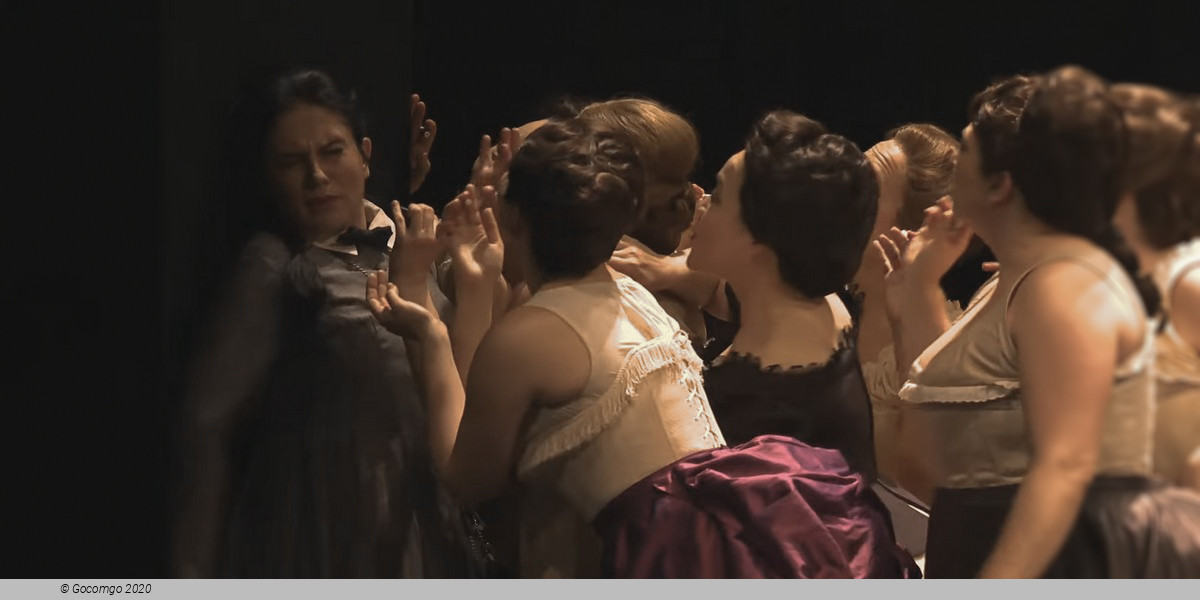
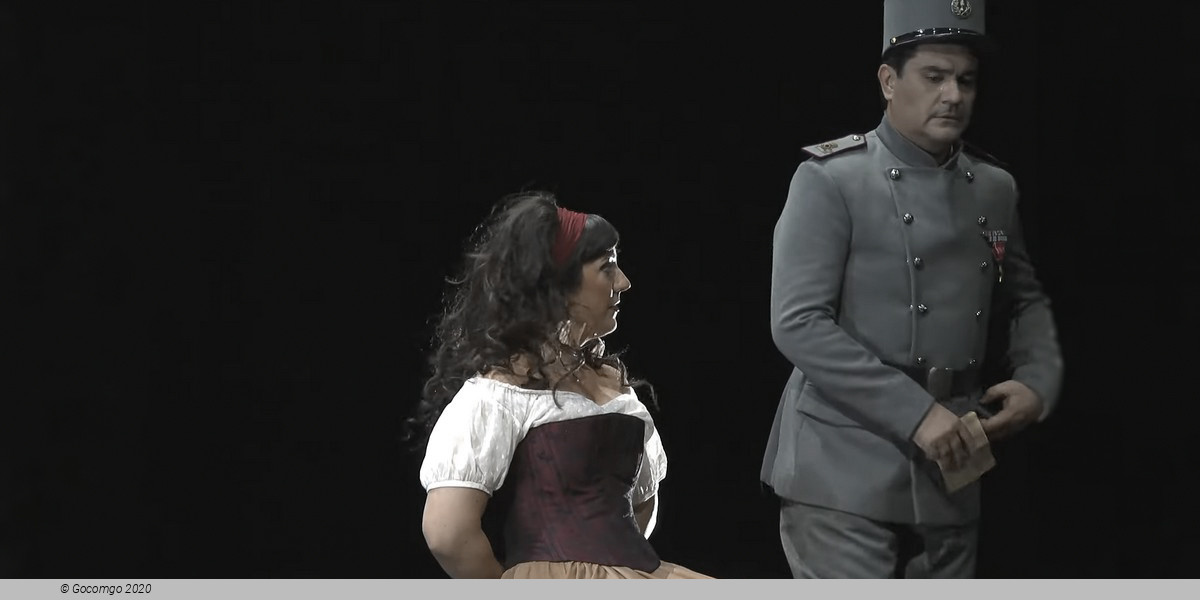
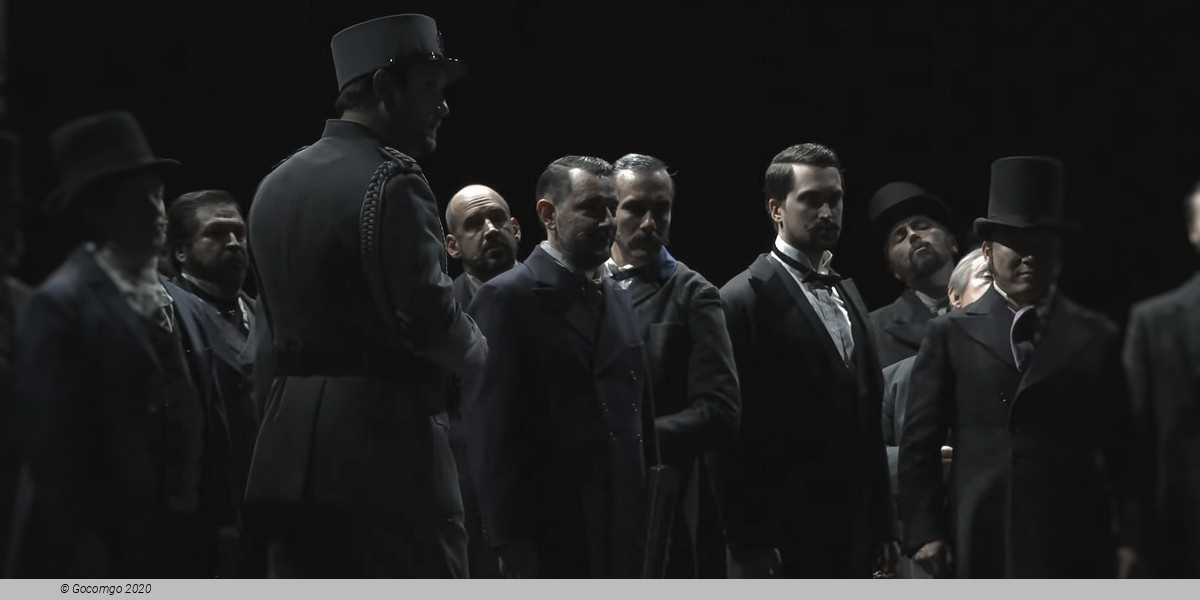
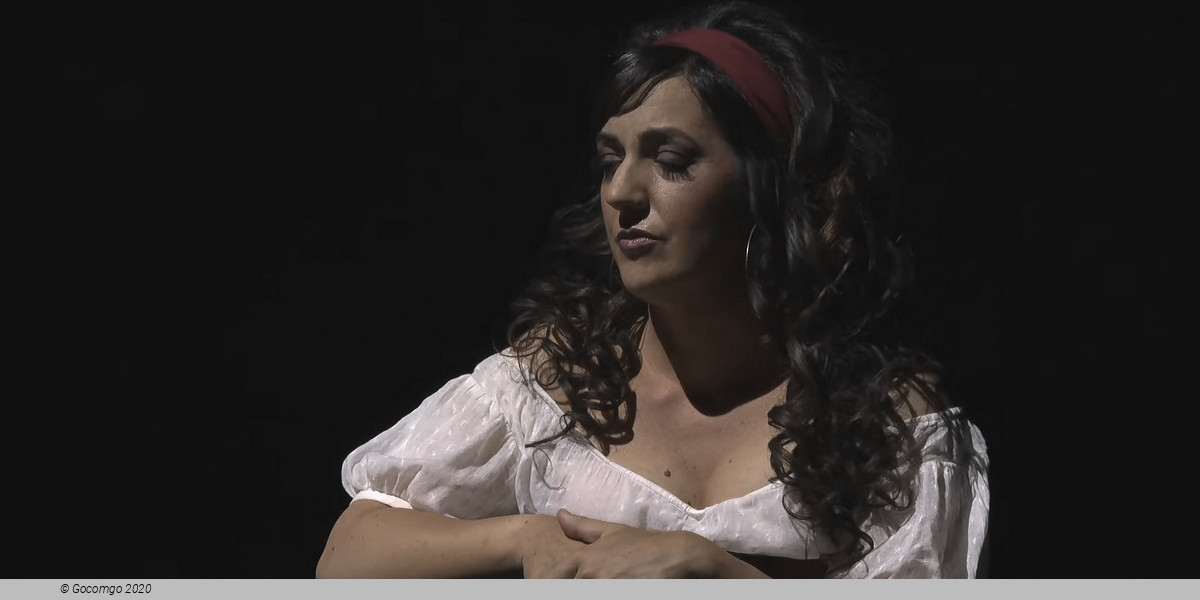
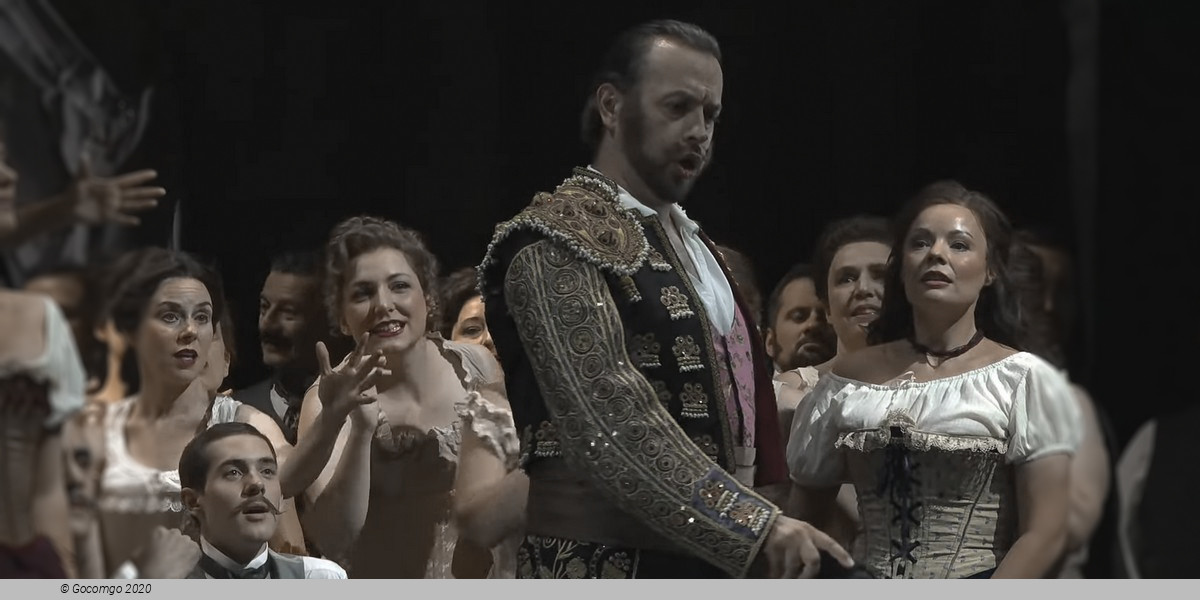
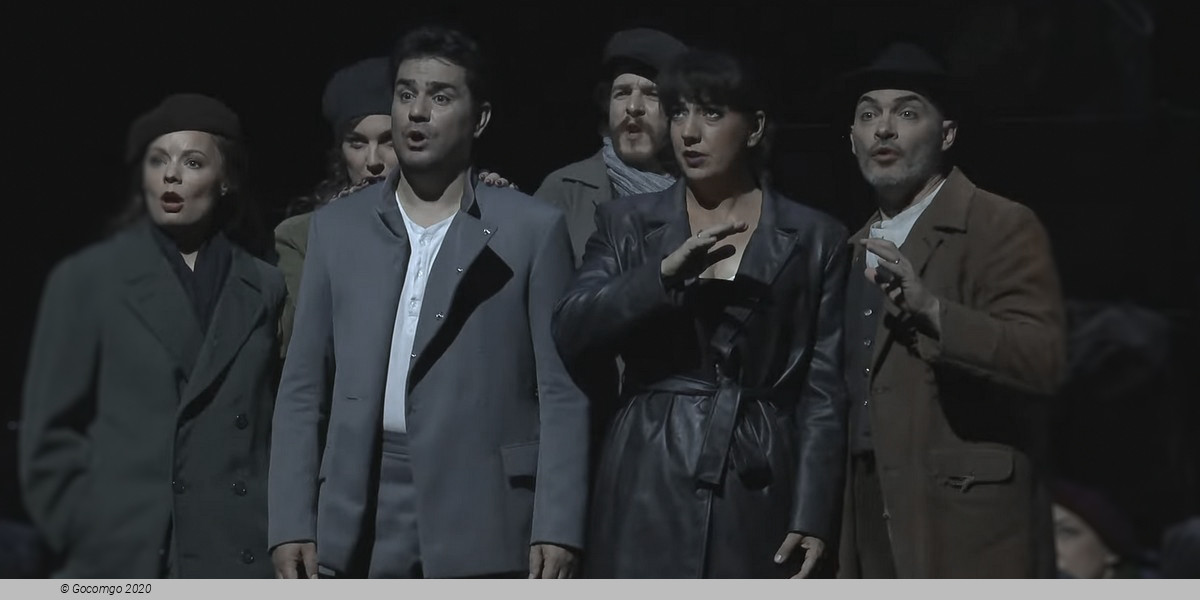
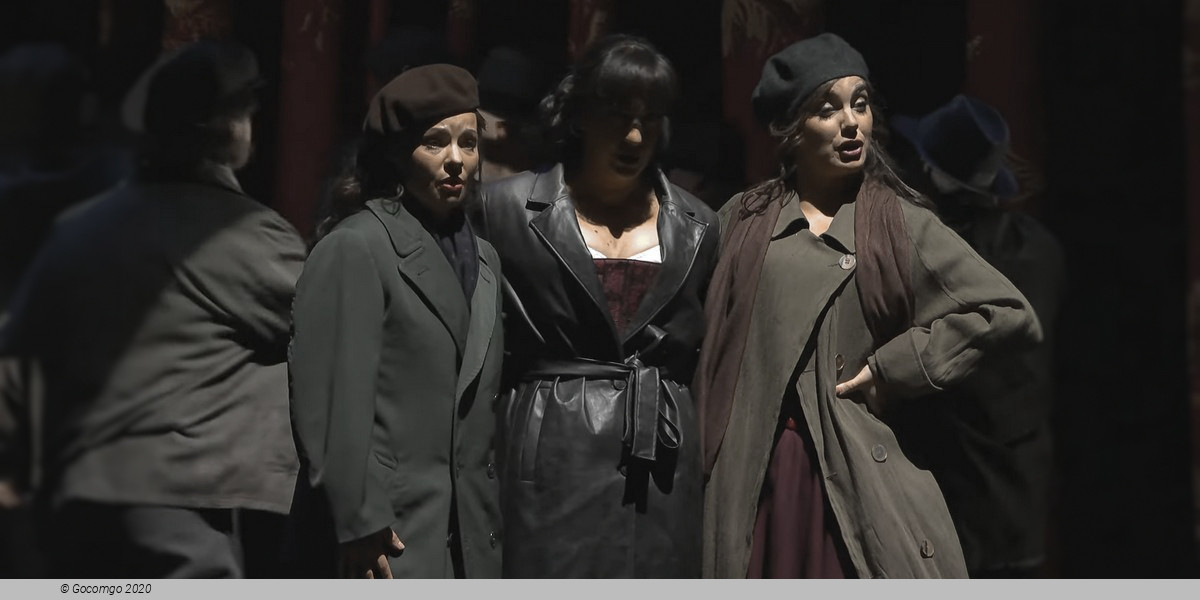
 Max-Joseph-Platz 2
Max-Joseph-Platz 2